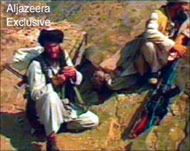Afghan electioneering gets nasty
Vice president and defence minister Muhammad Fahim has been considered the most influential and powerful military commander in Afghanistan – until last week.

But the marshal’s fortunes have changed dramatically after his dismissal as interim president Hamid Karzai’s running mate for the presidential elections in October.
Without a shot being fired, the man who led the Northern Alliance against the Taliban has entered the political wilderness.
Afghan politicians and analysts believe Karzai’s change of partner nine weeks before the presidential election has effectively split the Tajik vote.
More than a quarter of all Afghans are Tajiks. They number in excess of four million people and form the second largest ethnic group after Pashtuns.
Fahim’s replacement in the election race – Ahmad Zia Masud – is likely to exacerbate this split still further.
The brother of the legendary resistance hero Ahmad Shah Masud, and son-in-law of former prime minister Burhan al-Din Rabbani, Zia will guarantee a sizeable chunck of the Tajik vote for the Pashtun interim president.
Karzai’s policy, opponents say, is to be as divisive as possible.
Fahim response?
With the 9 October vote approaching, Karzai tells the western media he has rejected the country’s “strongest warlord” and put Kabul on high security alert in case of a violent response.
NATO has filled the streets of Kabul with troops for days, helicopters patrol the skies and journalists wait to report on the first rocket attacks – not from Taliban Pashtuns, but from Tajik defence minister supporters.
Foreign aid workers were even warned to stay at home until the situation calms down. Rumours circulated in the capital that armed forces loyal to Fahim might stage an uprising. It was an “orange alert” moment.
|
“It’s not like most voters know anything about the candidates, who they are really voting for, their policies or what they stand for” Sayyid Hashmatollah, |
Nothing happened.
Nevertheless, The New York Times told its readers on 31 July how dumping the vice president “was a necessary step and Washington should repay his [Karzai’s] courage with military support” during the run-up to the elections.
Meanwhile, the interim vice president’s response to his dismissal has been to back a new Tajik candidate for president, former education minister Yunus Qanuni.
Qanuni view
Announcing his candidacy the same day that Fahim was dumped, Qanuni believes Karzai – for his own political gain – “has sacrificed a man who had the ability to rein in the country’s military commanders”.
Qanuni claims that Karzai had never had a strong power base within the country since he was put in power after the US invasion in 2001, and has had to look for ways to break up the support of his rivals to stay in power.
Speaking to Aljazeera.net on Tuesday, Qanuni said that Karzai’s distancing himself from Fahim had also exacerbated inter-ethnic tensions.
“Ethnicity and disunity amongst ethnic groups has become a much more prominent factor – this is bad news for the country’s stability but good news for his [Karzai’s] chances of being elected.”
In an attempt to counter the appointment of Ahmad Zia Masud, Qanuni also hopes to benefit by associating himself with another brother of the assassinated Northern Alliance leader, Ahmad Wali Masud.
Electioneering
According to Afghan political analyst Sayyid Hashmatollah, Fahim was supporting Karzai’s policies to such an extent that he was on the verge of losing support among his ethnic Tajik backers.
“Fahim had come so far over to the government line that it is difficult now to consider him a genuine political force, even in north and east Afghanistan – particularly after his dismissal.
 |
|
Taliban fighters pose the gravest |
“But what Karzai has done now is guaranteed the fracture of the Tajik vote, brought himself a step closer to the presidency, put pressure on the US to give him even more military support and weakened central government by alienating the vice president.”
But even with 22 presidential candidates to divide the vote, not everything is going Karzai’s way.
Registration has not gone well in his own Pashtun south despite claims that nine out of 10 eligible Afghans have signed up to cast their ballot.
Registration problems
UN figures suggest one-third of the estimated 1.05 million voters in five southern provinces dominated by the country’s main Pashtun ethnic group have yet to register.
As a Pashtun leader, Karzai may lose out on some significant support.
Whereas the exact opposite has happened in the Tajik north.
In the city of Mazar-i-Sharif, for example, the UN believes the number of those registered had exceeded the projected total – suggesting either fraud or that the estimate of the electorate was far too conservative.
Worse, Taliban have also promised to step-up attacks specifically to upset the election process.
Shootings and explosions have killed at least nine election workers since May, including a worker and a would-be voter killed on Wednesday by a bomb in a mosque used as registration centre in Ghazni province.
And of course, as Hashmatollah points out, most people are just going to vote as the local strong man directs them to – which in effect means along ethnic lines and tribal agreements.
“It’s not like most voters know anything about the candidates, who they are really voting for, their policies or what they stand for.”